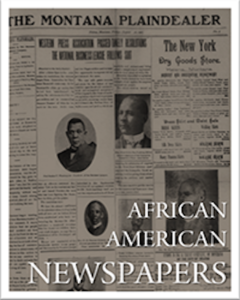
The first issue of The Montana Plaindealer, a Black weekly newspaper in Helena, Montana, was published on this date in 1906.
Owned and Published by Joseph Bass, the four-page, six-column weekly featured a regular column entitled “Race News,” which documented incidents of racial discrimination across the nation. One of the first issues featured a story about a lynching of two African American men taken from jail in Springfield, Missouri, by a white mob. In the early 20th century, Helena, Montana, was a community that included more than 400 Blacks, or about 3% of the city’s population. Bass came to Helena, a veteran newspaperman, having worked on the Topeka Plaindealer in Kansas.
Bass operated his paper at 17 South Main Street, assisted by Joseph Tucker, a Black printer and decade-long Helena resident. “This enterprise shall at all times strive for a greater Helena,” Bass wrote in his inaugural editorial, “and for mutual progress of all the people of the community, and for a greater activity of our people in the business world” was its philosophy.
Each issue contained exhortations by the editor Bass, promoting civil rights and highlighting economic opportunities for African Americans in Helena and across Montana. Just below the masthead in the inaugural issue, the editor advocated for “the principles of peace, prosperity, and union” while reporting the results of the pollical primaries for the city of Helena and noting the participation of two “colored” delegates from Helena. In 1909, the Plaindealer opposed an anti-miscegenation bill passed by the Montana legislature in March.
The Montana Plaindealer featured community news, especially the activities of the St. James AME Zion Church and the Second Baptist Church, the two principal Black congregations in Helena. A staunchly Republican paper, the Plaindealer claimed it marshaled some 1,000 African American voters in Helena and western Montana to provide Republicans with key votes. The Plaindealer consistently advocated racial “uplift” through editorials that urged entrepreneurial accomplishment, cultural development, and civic engagement. The Plaindealer increasingly advocated progressive political reform, including a commission form for city government and adopting initiatives, referendums, and recalls in elections.
Bass claimed that 75% of African Americans in Helena read the Plaindealer and white subscribers outnumbered black subscribers three-to-one. The paper received financial contributions from white Republicans and augmented its revenue with fund-raising social events and through an active printing business. Nonetheless, by September 1911, the Plaindealer fell on hard economic times, had to cease publication for lack of funds, and closed its doors.